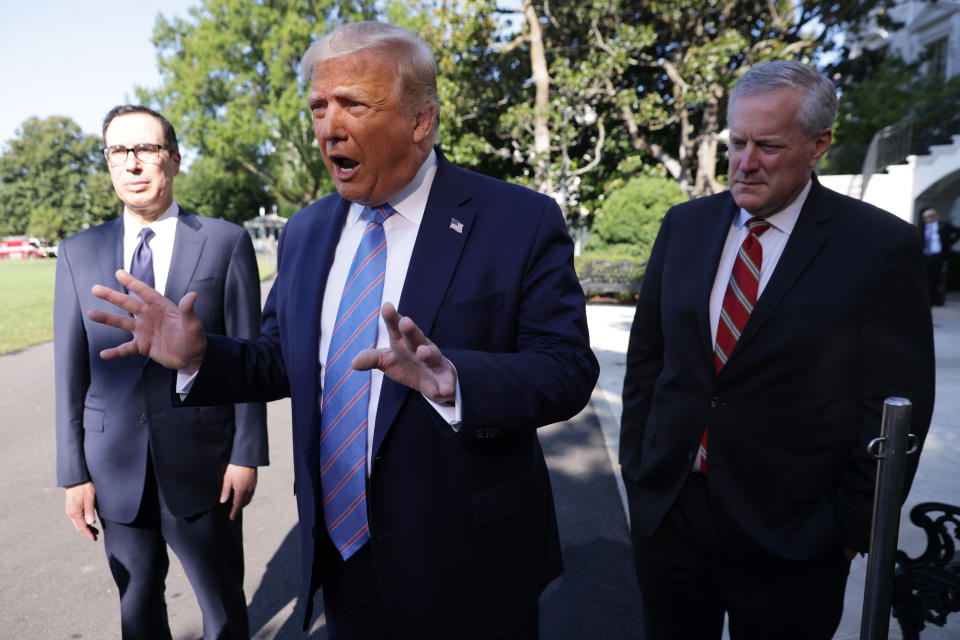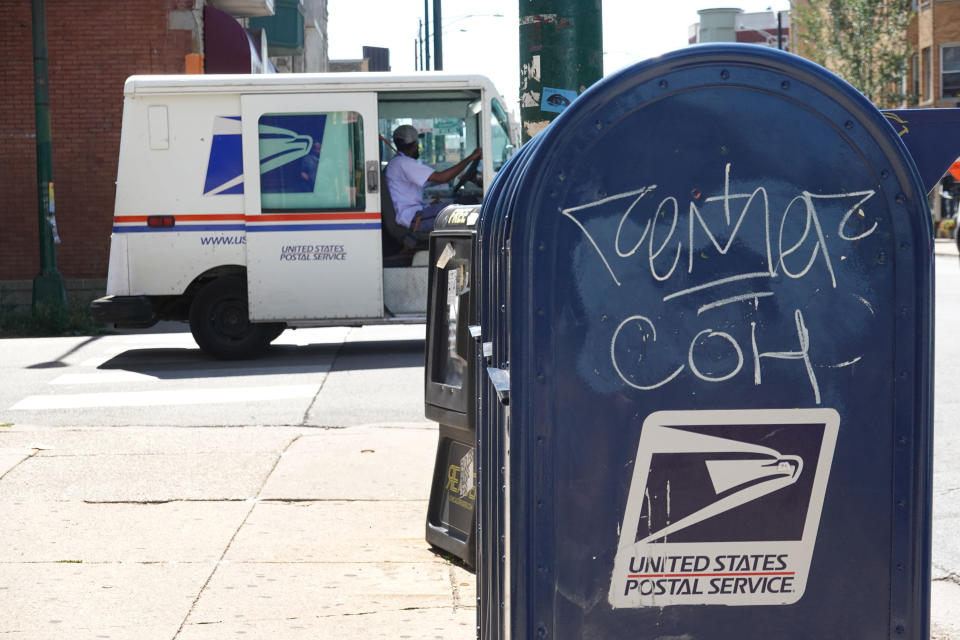Coronavirus stimulus: President Trump has become the key to any successful negotiation
President Trump is very much involved in negotiations of a new coronavirus stimulus bill — while also not being in the room as talks stall and millions of unemployed Americans wonder about the promise of extra weekly unemployment benefits.
“The more the president talks about something, the more attention people pay to it and the harder it may be to reach a compromise between the positions of congressional negotiators from the two parties,” Molly Reynolds, a congressional expert at the Brookings Institution, told Yahoo Money.
Senate Majority Leader Mitch McConnell (R-KY) ceded the GOP-side of negotiations to the White House, and the Senate adjourned through Labor Day after a third week of not reaching an agreement on the next stimulus package. President Trump, meanwhile, continued to call for certain provisions of any agreement.

Last weekend, the president attempted to bypass negotiations with unilateral action on a looming eviction crisis, student loans, extra weekly unemployment benefits, and payroll taxes while continuing to question the requests from Democratic leaders over the amount of additional funding for the U.S. Postal Service (USPS) and individual states. Amid the stalled talks and confusion of executive orders and memorandum, the White House is considering further executive action.
And despite not being directly involved in the negotiations — Treasury Secretary Steven Mnuchin and White House Chief of Staff Mark Meadows are the primary points of contact with Speaker Nancy Pelosi (D-CA) and Senate Minority Leader Charles Schumer (D-NY) — the president’s wishes have been putting additional pressure on already-tense negotiations.
“The president called several times while we were meeting,” Mnuchin told reporters in early August after a negotiating session. “Mark [Meadows] updated him.”

‘That creates problems when you're trying to reach an agreement’
In late July, after the first week of negotiations between the Republicans and Democrats in Congress, Senate Majority Leader Mitch McConnell (R-KY) ceded the GOP-side of negotiations to the White House and the president.
"Wherever this thing settles between the president of the United States and his team that have to sign it into law, and the Democrats,” McConnell told reporters in August, “is something I'm prepared to support, even if I have some problems with certain parts of it.”
And while Republicans defer to the White House, the president’s involvement has brought more uncertainty to the negotiating table while more than 15 million unemployed Americans wonder about the resumption of weekly federal stimulus aimed at buoying people amid the pandemic.

“[President Trump] will say things publicly that either he hasn't discussed with his team or which his team doesn’t universally agree,” Reynolds said. “That creates problems when you're trying to reach an agreement because you don't entirely know where the White House is at any given point.”
While the two parties each had key positions the weren’t ready to compromise on — Pelosi sticking to more aide to local governments while McConnell was insisting on liability protection for businesses — Trump’s positions were bringing an additional set of uncertainty, according to Reynolds.
“The uncertainty that the president’s positions can introduce into negotiations has been a challenge for Congress and working with the White House throughout the Trump administration,” she said. “But it's certainly also part of what's happening now.”
‘By injecting the issue of the post office into this debate...’
One of the issues President Trump has strongly opposed is the Democratic proposal for $25 billion of funding for USPS to support an expected loss in mail revenue and an increase in mail-in voting for the November election.
“They want $3.5 billion for the mail-in votes. ... They want $25 billion for the Post Office,” Trump told Fox Business on Thursday. “If they don’t get those two items, that means you can’t have universal mail-in voting because they’re not equipped to have it.”
Drawing the attention to this issue has made reaching a deal more complicated, according to Greg Valliere, AGF Investments Chief U.S. Policy Strategist.

“By injecting the issue of the post office into this debate Trump has made it even more complicated,” Valliere told Yahoo Money. “The idea that he would oppose funding for the post office to help him make his argument that mail-in balloting is a fraud is outrageous.”
Read more: Here’s what you need to know about unemployment benefits eligibility
In any case, the president not supporting additional funding for USPS makes that issue more central in figuring out how Republicans and the Democrats in Congress can reach a deal, according to Reynolds.
“The more he talks about the issue of additional funding for the Postal Service and articulates very clearly why he is not supportive,” Reynolds said. “It makes that issue more central in trying to figure out how Republicans and Democrats in Congress would get a ‘yes’ on a deal.”
Denitsa is a writer for Yahoo Finance and Cashay, a new personal finance website. Follow her on Twitter @denitsa_tsekova.
Read more:
Analysis: 1 in 3 jobless Americans could be left out of Trump's action on unemployment
Even as GDP tanked, personal income grew thanks to government support
Read more personal finance information, news, and tips on Cashay
Follow Yahoo Finance on Twitter, Facebook, Instagram, Flipboard, SmartNews, LinkedIn, YouTube, and Reddit.



